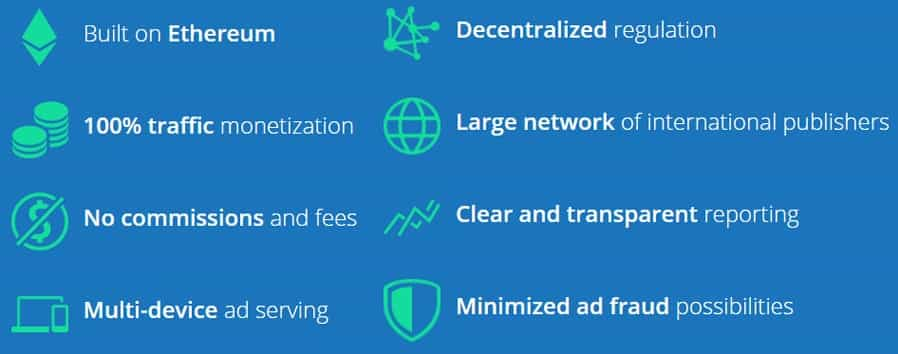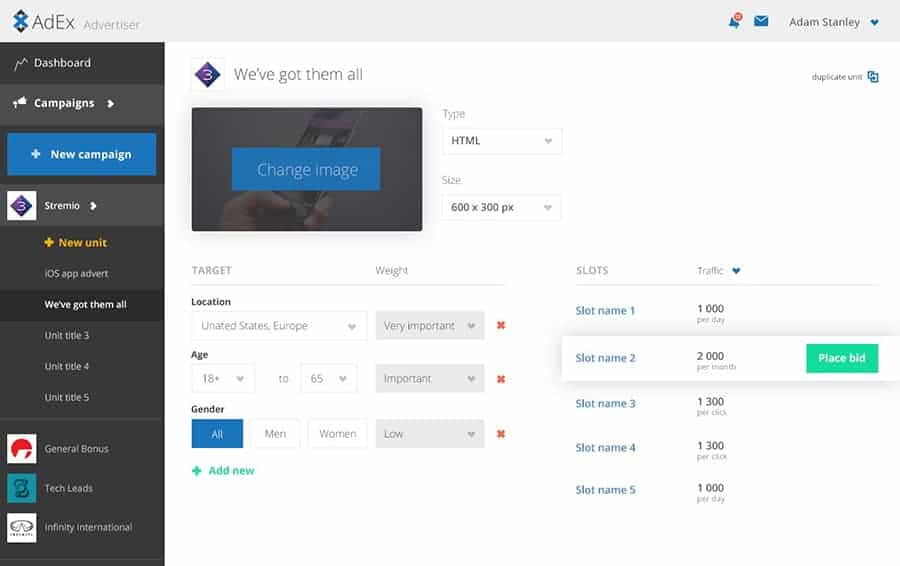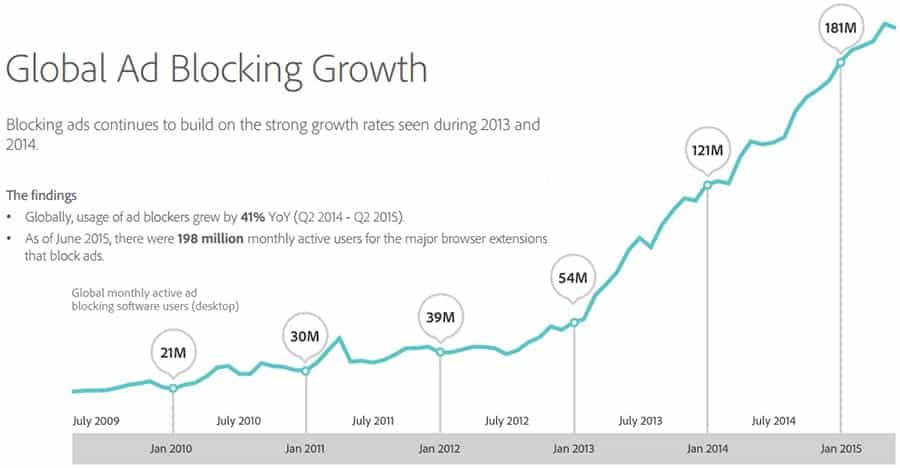AdEx Network Review: The Blockchain Based Ad Network
AdEx (ADX) joins a long list of blockchain projects that are trying to change the online advertising ecosystem and make it more honest and secure.
AdEx completed an ICO in 2017 and garnered a great deal of interest during the 2017 bull run. However, given the general fall in the cryptocurrency markets and an influx of decentralised competitors, the project faces a tougher environment going into 2019.
So, can AdEx cut above the competition and deliver the vision they had laid out?
In this AdEx network review we will give you everything that you need to know about the project. We will look into the underlying technology, development roadmap and platform use cases. We will also touch on the potential for ADX token adoption and the resulting price performance.
What is the AdEx Network?
AdEx is a decentralized platform being built to offer an online advertising solution that connects advertisers and publishers directly to negotiate advertising prices without the intervention and expense of a third-party intermediary.
The project is also looking to create solutions for internet users by building a platform that lets them specify the types of ads they want to see, as well as providing management for their personal data and privacy.

AdEx is entering a crowded space, with a number of new blockchain projects targeting the advertising exchange industry. Some other platforms working in the space include Basic Attention Token, Bitclave, adChain and qChain. AdEx is tackling the industry from the unique angle of unrestricted access, transparency, and no fees.
The overriding mission of AdEx is to disrupt online advertising by solving problems related to privacy, excessive ad blocker usage, and advertising fraud. And of course they are thinking of users by implementing a consent-based system to opt-in to sponsored messages.
AdEx was originally built on the Ethereum blockchain, but has plans to port over to the NEO blockchain. This was announced in August 2017, but there is no set timeframe for the move and AdEx remains and Ethereum-based platform.
This is how the team explains the goal of AdEx on their website:
We believe we can empower advertisers and publishers with a platform that is secure, transparent and beneficial for all the parties involved in the process, consumers included.
AdEx was able to partner with big names such as Stremio, Fintech Blockchain Group and Bitmain right from the outset, giving it a leg-up on the competition.
The Features of AdEx
Users, publishers and advertsiers all benefit from the core feature set of AdEx, which includes all the following:
- Detailed reporting;
- Available for all internet browsers;
- User privacy is a top priority;
- Governance by end users
- Heavy focus on media, entertainment and gaming industries.
In general all of the features of AdEx will replace the traditional advertising platforms and models currently in use.
AdEx in Use
The core of AdEx is the User Profile. This is a personalized portal that allows each user to understand and control what ads are delivered to them. This is a key to the platform, because the AdEx team believes that giving the user control over the advertising experience will benefit everyone involved.
Advertisers benefit because they will be able to access more detailed user information, including purchase preferences, shopping habits, and brand preferences. All of this will be voluntarily supplied by users.

Because the advertising platform is built on the NEO blockchain it benefits from transparent reporting and an immutable record of every detail of an advertising campaign and its performance.
We can get a better idea of the benefits provided by the platform by looking at the problems it promises to solve.
The Problems that AdEx can Solve
There are a number of problems that have been created by online advertising, and AdEx is focusing on solving those mentioned below:
No Consumer Consent
Modern online advertising networks (Facebook, Google, etc.) do give users some control over what ads they see, but it’s a very limited amount of control. AdEx will begin to fix this by giving everyone their own personal user profile to block any ads or advertisers they aren’t interested in seeing.
This is good news for advertisers too, since they have better targeting and higher conversion rates.
Data Misuse and Privacy Issues
We’ve all seen the allegations of data misuse from major advertising networks. A good deal of this occurs because these traditional networks keep massive amounts of centralized data that can be stolen and linked to users identities. Perhaps worse is that users have no idea how their own data is being used, introducing serious privacy concerns.

Because AdEx uses blockchain technology they will be able to anonymize user data. This means the data is no longer tied to any one individual, but can still be used for statistical analysis. Advertisers get the valuable data they need about campaigns without getting any personally identifiable information that threatens user privacy.
Lack of Transparency in Bidding
It’s somewhat surprising, but online real-time bidding platforms give advertisers very little information about what they are bidding on. Advertisers are told what property they are bidding on, and what the maximum required bid is, but they have no way to verify any of this in a transparent way.
Once again, the fact that AdEx is built on a blockchain helps to solve this problem, because everything remains completely transparent. Every component of a campaign can be traced and every click and impression can be verified. Advertisers can verify ad placements and participation in ad campaigns. And because the information is stored on an immutable blockchain there is no way for any third-party to manipulate or alter the data in any way.
Advertising Fraud
The online advertising world is rife with fraud. Some reports say that up to $15 billion of online advertising fraud occurs each year. While AdEx doesn’t go into the details of how it works, they do have a technical means to prevent fraud and invalidate fraudulent advertising traffic. How well that works will almost certainly have some impact on adoption of the platform by advertisers.
Ad Blockers and Ad Blindness
Ad blockers are increasingly in use by consumers, with estimates of more than 600 million devices worldwide having some sort of ad blocker installed. Consumers can’t be blamed for installing ad blockers as they are exhausted by seeing irrelevant and intrusive ads continually.

AdEx plans on solving the ad blocker problem by keeping ads relevant and useful for consumers, and removing the ads they don’t want or need to see.
AdEx Competition
As mentioned above, there are competitors in the blockchain advertising exchange space. Basic Attention Token and their Brave Browser have gotten a lot of attention, and there are also Bitclave, adChain, NYIAX and qChain to consider.
AdEx specifically addresses how their product will differ from competitors in their whitepaper:
While all these ad exchanges come from strong teams, the truth is we are all sailing in uncharted waters here. This is why it is extremely important to have exceptional understanding of both cryptography and ad tech, as well as to stay as open as possible in terms of platform and device availability.
The difference in AdEx is that it attempts to remove restrictions. BAT has restricted itself to the Brave browser. Adchain is limited to functioning as a registry. And NYIAX is limited to the financial industry.
But AdEx is targeting every part of the online advertising industry, and will work in any browser or operating system. That said, they aren’t unaware of the competition they face:
We are excited about the fact that we do have competition as this will push us to deliver a service superior to the others.Competition is healthy and will benefit the entire advertising ecosystem.
The ADX Token
AdEx held its ICO in June 2017, raising $12 million in under 8 hours. ADX tokens were priced at $0.2399 in the ICO. ADX tokens are ERC-20 compliant utility tokens to be used on the AdEx platform to buy and sell advertising space or time.
As with other advertising exchanges, advertisers will be able to bid on specific properties for a given number of impressions, clicks or conversions. When a publisher agrees to a bid the ADX tokens are held in an escrow-like state until the publisher completes the goal specified in the bid. Once that occurs the tokens unlock and are sent to the publisher wallet.

There is a total supply of $100 million ADX and the circulating supply is currently 73,430,701. As of December 5, 2018 the token price is $0.11222, which is a bit disappointing given the ICO price was nearly triple that amount. Like nearly every other token ADX has seen a steady decline in the bear market of 2018.
The token is listed on a few of the largest exchanges and the greatest trade volume is from Upbit, followed by Binance. Bittrex and Huobi also see a small amount of trading volume.
As an ERC-20 token, ADX can be stored in any compatible wallet, like MetaMask or MyEtherWallet / MyCrypto.
The AdEx Team
AdEx began as a side project of Stremio, when that company was unable to find an advertising solution that fit their needs. Instead they decided to create their own advertising exchange and AdEx was born.
The co-founders of AdEx are Ivo Georgiev and Dimo Stoyanov, and together they bring extensive experience in software development, online advertising and blockchain to the table.

In addition to the obvious partnership with Stremio, they have also partnered with Bitmain and Wings to help bootstrap the growth of AdEx. Bitmain has previously been an investor into Stremio and Jihan Wu of Bitmain is a strategy adviser to AdEx.
AdEx was launched in June 2016 and was able to deliver the first working prototype of its platform in February 2018. The prototype has a basic bidding system and front-end interfaces for both publishers and advertisers. The team is now most focused on fine tuning their basic platform and on business development to increase the user base.
Conclusion
AdEx is aiming to disrupt the online advertising industry with a solution that is transparent and more effective for both advertisers and publishers. They are also taking the user into account, hoping to develop a user profile system that allows users to control what ads they do, and do not, see.
By using smart contracts on the Ethereum blockchain they are giving advertisers and publishers transparency and immutability, while also helping avoid fraudulent transactions.
While the price decline in the token has been unfortunate, the team continues working hard, and has been meeting any development deadlines set for themselves. This is an encouraging sign, and now we simply have to wait and see if they can gain enough traction to significantly increase adoption of the platform.
Disclaimer: These are the writer’s opinions and should not be considered investment advice. Readers should do their own research.
